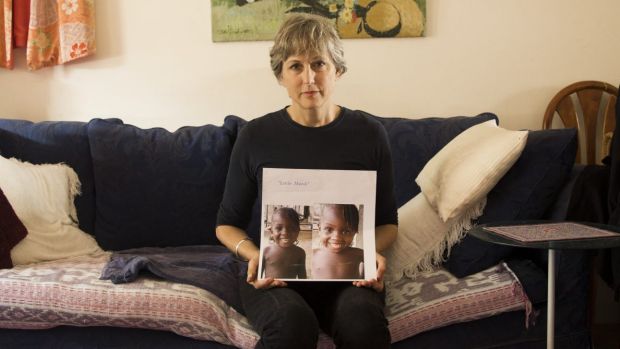
Mardi Kendall, director of Eco Guinea, with a photo of an orphaned girl in Guinea. Photo: Nic Walker
A Sydney charity is leading the charge to raise funds for thousands of Ebola orphans struggling to survive in Africa.
New research from UNICEF reveals about4000 children in West Africa have lost one orboth of their parents to Ebola.
Bronte resident Mardi Kendall, a director of the EcoGuinea charity, has made a personal plea for donations for the everyday care and school education for the orphans.
“There has been thousands of Ebola children left behind, though it is normal in Africa for these children to be absorbed into larger families, the families are already struggling like mad,” Ms Kendall said.
“There are a lot of orphans who aren’t being cared for properly.”
After visiting Guinea for the first time in 2000, Ms Kendall had a strong inclination to spend the rest of her life working to promote sustainable living and, more recently, to help prevent thespread of Ebola.
“It chose me, it was this feeling, like an epiphany that only happens a few times in life, I went there and I said ‘this is where the rest of my life is’.”
Despite Australia contributing $18 million to the international response, Ms Kendall has personally funded much-needed hospital cleaning supplies as well as an education campaign with the help of NGO partner Lee McKerracher.
She said the programs have been a huge success within the community.
“So far our teams have educated over 1000 people across many villages in the Kindia and Forécariah prefectures in western Guinea.”
She said the need for help was urgent.
“The families are too poor to care for them [the orphans], they are already strained to the breaking points,” Ms Kendall said.
“They can hardly feed who they have, they will take them in but it is not always successful, they are just so poor.
“People are struggling to eat, much less keep their kids in school, so I am really concerned about all these kids left behind.”
Ms Kendall, who has previously funded surgical operations and medical treatments for malaria and typhus,said families cannot afford to send their kids to school with many taking in orphaned children.
“They can’t afford to send their kids there, if they are out of school for a year they do not let them back into that grade, it is a vicious cycle.”
With more than 21 per cent of the 9000 Ebola deaths occurring in Guinea, fear the disease will spread further is common and many orphans become neglected and ostracised.
“There is also fear and superstition about them [the orphans] in regards to having survived, not gotten or been around people who died of Ebola.
“There are many thousands of orphans flooding a social system that was barely functioning before and EcoGuinea would like very much to focus on this issue,” Ms Kendall said.
The non-government organisation’s aimis to promote eco-technologies within Guinea as well as implementing more education programs to teach locals about sustainable living and sanitation.
“Without education we will never stop the epidemic, if people do not know what to expect they will do all the wrong things.”
The Ebola outbreak began in December 2013 in the remote Guinean village of Meliandou and has been predicted to be the largest Ebola epidemic recorded.
